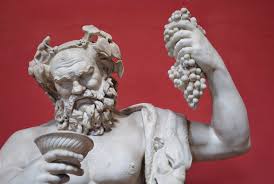
The chapel message began with a photo of a stuffy, serious, boring old teacher. And the speaker’s concern was: “Many of you think Jesus is like this guy.” The speaker meant well. He wanted to challenge young people who thought Jesus wanted them to sit down, shut up, and wipe the smile off their faces. He wanted kids to realize Jesus had a bigger vision than just taking off your hat during prayer time and memorizing the King James Bible.
So he told the story of Jesus turning water into wine and asked: “Is the Jesus in this story boring and strict?” It was a rhetorical question. The obvious answer was no. Jesus had created huge bottles of fine wine to keep a crowd of people celebrating at a 7-day wedding party! That is not the action of a killjoy. He didn’t come to rain on our parade but to throw us a parade.
Unfortunately, his point seemed to imply that Jesus likes to get people a little tipsy and have a good time—at least that is how all of my high schoolers understood it. Needless to say I was not pumped to have a spiritual authority insinuate that Jesus would bring 3 kegs to a party if he were here. That’s not the message a bunch of underage kids needed. But who could blame him? How else could you understand the character of a man who miraculously produced vats of alcohol for a party?
Who was John’s original audience?
Jesus’ water-to-wine miracle is confusing, mysterious, and somewhat misleading when we don’t know why John decided to put it in his Gospel. But that’s a question we should ask: why is John the only Gospel writer to include the story? Out of Jesus’ many amazing actions that John says could have filled book after book (see John 21:25), John chose this story to uniquely impact the audience of his Gospel. So what about John’s audience made this miracle so pertinent to their particular situation?
Based the evidence from church historians and John’s Gospel itself, we know John’s audience was primarily a group of Hellenistic Jews and Gentile God-fearers who lived in Asia Minor (modern-day Western Turkey). That means they were either Jews who grew up in a Greco-Roman world with all of its religious beliefs or Gentiles who had developed a deep appreciation for elements of the Jewish faith.
What’s important for you to know is that this group of folks in Asia Minor grew up walking by Greek temples and going to festivals that honored Greek gods. The ceremonies and secret rituals that they participated in to secure divine favor got pretty eccentric, but people didn’t know where else to turn for truth, protection, and eternal life. And one of the most popular festivals at the beginning of every year had a direct link to Jesus’ miraculous wine-making. That’s why John decided to tell his unique audience this unusual story.
At the end of water-to-wine episode, John concludes: “This was the beginning of the signs Jesus did in Cana of Galilee and it manifested his glory” (John 2:11). These words tell us the point of the story. The miracle had revealed Jesus’ “glory.” Since that is a fairly vague expression in our world, we need to define it.
In John’s Gospel, “glory” is a characteristic of the divine Father. Again and again and again, it describes the God of all things who sent Jesus to earth. Attributing glory to Jesus in John 2:11 is a claim that Jesus shares the divine greatness. And changing water to wine proved it.
Why did making wine demonstrate Jesus’ unique reflection of the Father’s glory? You may first think Jesus is reenacting an ancient miracle that God performed for Israel. However, in the Jewish Scriptures you will not find any stories of God turning water into wine. No ancient poem or prophecy depicts Israel’s God demonstrating his divine greatness that way.
Jesus’ miracle only makes sense when you place it in a Greco-Roman context. In the Greco-Roman world they told stories about how wine was created. The details changed, but the main actor remained the same. The god Dionysus was the originator.
Greek Legends of the God of Wine
Legends are told that vines full of thick clusters of red grapes grew from the ground where Dionysus’s blood fell. And then Dionysus taught humanity how to create wine from those grapes.
Achilles Tatius in The Adventures of Leucippe and Clitophon recalls how a kind farmer and herdsman, Icarius, set a meal before the god Dionysus in the days when humanity had no good refreshments. In those days, people drank the same water as their oxen. So Dionysus thanked the herdsman for the meal by giving him a cup to drink. But instead of finding water in the cup, Icarius found the god's own wine. In his excitement, he begged the god to know how such fine drink was made, and Dionysus told him. According to legend, the manufacture of wine spread from there, and a festival was established to honor the god's gift to humanity.
Rooted in these legends is an enduring association of Dionysus with vines, grapes, and wine. The appearance of grapevines and wine became one and the same as the appearance of Dionysus the god himself. The Homeric Hymn 7 recounts how the sudden appearance of a vine proved the presence of the god. In the midst of a fearful situation on the water the Homeric narrator interjects,
“Then in an instant a vine, running along the topmost edge of the sail, sprang up and sent out its branches in every direction heavy with thick-hanging clusters of grapes, and around the mast cloud dark-leaved ivy, rich in blossoms and bright with ripe berries.”
In other parts of the Greco-Roman world, the miracle of "one-day vines" became popular and supposedly occurred at multiple ancient sites for Dionysus worship.[1] Sophocles in his Thyestes records that in Euboea one could watch the holy vine grow green in the early morning. By noon the grapes were already forming, and by evening the dark and heavy fruit could be cut down and a drink made from them. Pretty impressive stuff.

Miracles demonstrating the presence of Dionysus became a mainstay at annual festivals. According to one Greek writer, Pausanius, people celebrated the feast of Dionysus at the beginning of every year. It was a rollicking, raucous event of the sort you might expect to be linked to a deity that makes wine in abundance and represents the renewed fertility of the earth.
At one New Year festival in the city of Ellis, Pausanias recounts a curious phenomenon that proved the god’s presence had returned to earth.
Three pots are brought into the Temple and set down empty in the presence of citizens and of any strangers who may chance to be in the country. The doors of the building are sealed by the priests themselves and by any others who may be so inclined. On the morrow they are allowed to examine the seals, and on going into the building they find the pots filled with wine. I did not myself arrive at the time of the festival, but the most respected Elean citizens, and with them strangers also, swore that what I have said is the truth. The Andrians too assert that every other year at their feast of Dionysus wine flows of its own accord from the sanctuary. [2]
No matter how the wine appeared at these festivals, the presence of wine meant the presence of the god. The one who brought fertility to the ground, who made thick clusters of grapes grow on vines, and who taught humanity to make wine was among his people. Everyone knew when water turned to wine or tasted like wine, god was there. That is precisely what John’s audience knew when they heard the story of Jesus’ miraculous wine-making.
Jesus’ Actions in a Greco-Roman Context
So what would Jesus’ creation of wine out of water have meant to John’s audience? The answer is simple and clear once you know what John’s audience knew. They lived in a Greco-Roman world that associated miraculous wine-making with the benevolent presence of the god Dionysus. Although Jesus’ first Jewish audience in Israel would connect the new wine to OT prophecies of God’s saving presence returning to his people (Isaiah 25:6-9; Hosea 14:7; Joel 2:18-27; Amos 9:11-15), John wanted his audience to see another profound truth: Jesus is the real God, not Dionysus.
Jesus’ miracle attacks the claim that new growth in the vineyards and the production of fresh wine manifest Dionysus’s benevolent presence. Jesus is actually the source of all good things that come from the ground. Jesus doing what Dionysus’s followers claimed their god did displayed Jesus’ divine glory. The message to everyone who would hear what he did was: God is here.
That symbolic statement of the arrival of God’s presence would catch the attention of everyone who had misunderstood it for years. Jesus is the real God who has created all the blessings that grow out of the ground. The grapes and every other form of vegetation that can be turned into savory drinks and fine foods are his gift to humanity.
When we understand the cultural and religious context, we know Jesus’ water-to-wine miracle didn’t encourage drunkenness. John wasn’t trying to make Jesus’ image more appealing to social drinkers. He told the story so his Hellenistic audience could recognize God’s benevolent presence—that Jesus created a world full of refreshment for us.
So how can we reenact the purpose of the water-to-wine miracle in our context today? Remember, an obedient response to the actions and instructions of Jesus always involves both fidelity and creativity. We must be faithful to the point of his choices and words, but we must also be creative in how we reenact that purpose in our own time and place.
One way is to create clean water in communities where none exists. To provide a local source for clean water in the remote areas of Africa can have the same effect that Jesus’ miracle had on John’s audience. It can be a sign of God’s presence that every community member tastes. Creating a cup of clean water out of disease-infested water can demonstrate the loving presence of Jesus. That’s what clean water ministries like LifeWater do.
So if you want to get started demonstrating the benevolent presence of God to people who are missing it, you can join the mission of ministries all around the world who bring good things out of the earth that God designed for them to enjoy.






 RSS Feed
RSS Feed
